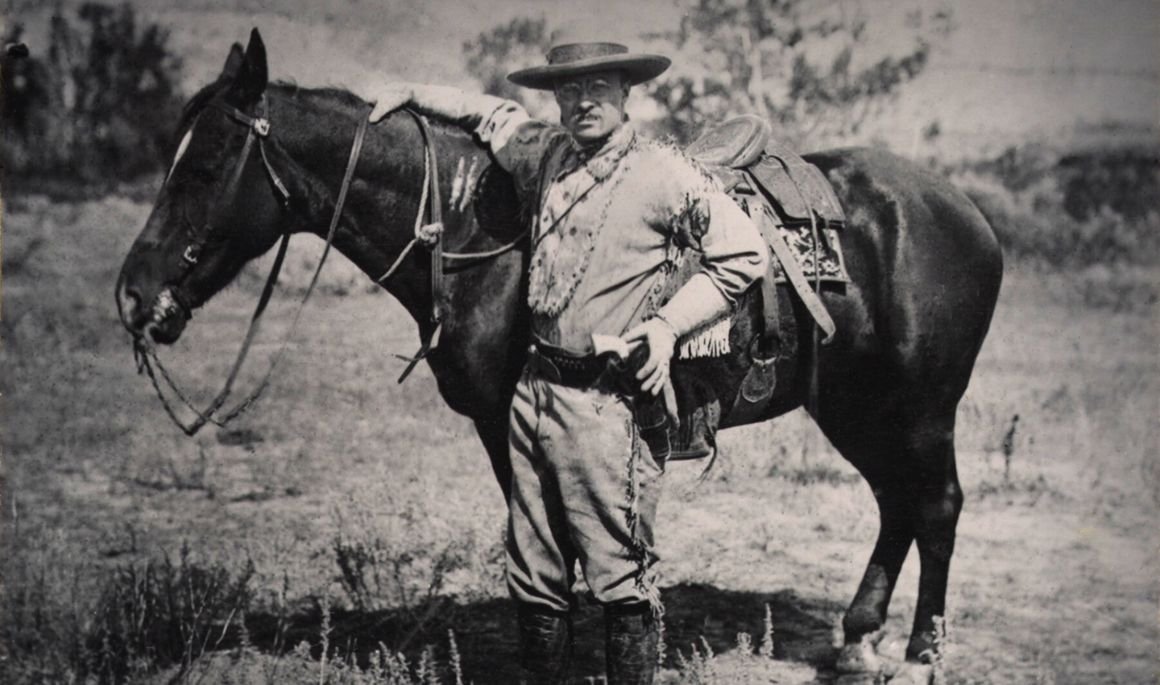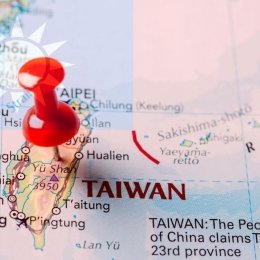- Norwich Blogs
- Blogs
- Theodore Roosevelt: War Lover or Peace Maker?
Theodore Roosevelt: War Lover or Peace Maker?
By Edward Kohn
This reflection on Teddy Roosevelt’s legacy portrays him as a pragmatic statesman who embraced realpolitik—pursuing both robust military action (e.g., the Great White Fleet) and diplomatic work (e.g., negotiating peace). Despite his imperialistic inclinations, Roosevelt also championed agreements that maintained global balance.

Disclaimer: These opinion pieces represent the authors’ personal views, and do not necessarily reflect the official policies or positions of Norwich University or PAWC.
If I asked you right now to picture in your mind Theodore Roosevelt, I think I have a good idea of that picture. Likely it is not the dour portrayal of Roosevelt in his presidential portrait painted by John Singer Sargent, a copy of which hangs in my office. Instead, you are probably thinking of the many caricatures or political cartoons depicting the twenty-sixth president with martial trappings. Maybe he is holding a big stick, tribute to one of his favorite aphorisms based on the tip for hunting lions: “Speak softly and carry a big stick.” Maybe Roosevelt is dressed in his Rough Rider uniform, with his cover pinned up on one side. Maybe he is dragging behind him toylike battleships representing his “Great White Fleet” – “white” representing not Roosevelt’s fervent Anglo-Saxonism but the color American battleships were painted in peacetime. Or maybe you are simply picturing one the many depictions of Roosevelt and the Rough Riders charging up the San Juan Heights, also referred to as Kettle Hill. One of my favorite depictions of the Battle of San Juan Heights is by Frederic Remington, who, like Roosevelt, was an eastern Ivy Leaguer who helped romanticize the American West.
All these portrayals of Roosevelt are apt and led historian Evan Thomas to include Roosevelt in his 2010 bestselling book, The War Lovers: Roosevelt, Lodge, Hearst, and the Rush to Empire, 1898. Thomas had no shortage of anecdotes to label Roosevelt a “war lover.” At nearly forty years-old and nearsighted, Roosevelt had left his position as Assistant Secretary of the Navy to seek combat and glory in the Spanish-American War. That was not all he had left behind. Roosevelt was married with six children, the youngest, Quentin, being less than a year old. But as TR would later confide, he would have deserted his wife’s deathbed to go into battle. As a child of the Civil War, born in 1858, and with uncles who fought famously for the confederacy, Roosevelt was of the generation who viewed combat romantically and as proof of both citizenship and manhood. He also felt that periodic wars were necessary to refine and temper the nation like one might do to a sword, blasting out the impurities and forging a stronger weapon.
Yet as the thoughtful and intellectual Sargent portrait of Roosevelt indicates, TR was more than just a caricature. Yes, he was Harvard educated and spoke fluent German, the result of six months living with a German family in Dresden in his youth. He had also traveled with his family on two “Grand Tours” of Europe and the Middle East, tours that included a houseboat trip down the Nile, a visit to the Holy Land, and, in Constantinople, watching the Ottoman Sultan arrive at the Hagia Sophia mosque for Friday prayers. Roosevelt was an amateur historian who authored over forty books, and an accomplished natural scientist who listed in his journals the animals and birds he observed – and often hunted – by their Latin names. All that is to say, he was an “Americanist” who also knew and understood the larger world and its languages, a hunter who championed conservation, and an educated intellectual who liked nothing more than to camp under the stars. He was also a war lover who worked for peace.
While Theodore Roosevelt has been depicted as being a “cowboy” in foreign policy – masculine, quick to draw, and never backing down – Roosevelt understood the limits of American power. The United States did not go to war during his presidency, and he limited his big-stick brandishing to the Western Hemisphere. He also worked with other nations to secure peace. When the long-discussed European war seemed about to break out over Morocco in 1905, President Roosevelt used his influence in Berlin, London, and Paris to organize an international conference, held at Algeciras in Spain. In a stark departure from traditional American policy, the United States sent two delegates, including close friend and accomplished diplomat Henry White. The United States was also a signatory to the resulting Algeciras Convention that gave trading rights to Germany and other powers in Morocco but confirmed France and Spain’s privileged positions there. During the Senate debate over the Convention, senators rightly noted this marked a break with the Monroe Doctrine prohibiting American involvement in European affairs. Instead, we might view this as a further “Roosevelt Corollary” to the Monroe Doctrine: American intervention in European affairs was justified to prevent a European war from engulfing the United States. In other words, Roosevelt saw much earlier than most of his fellow Americans that European peace translated into American peace.
More well-known is Roosevelt’s convening of the Portsmouth Conference, the first peace conference ever hosted by the United States. Roosevelt personally intervened in the negotiations to bring an end to the Russo-Japanese War, including direct appeals to the Russian Czar and his fellow monarch the German Kaiser. Working through fellow Harvard Alumnus Baron Kaneko, Roosevelt also warned the Japanese delegation that international opinion would turn against Japan if the war continued only because of Japan’s demand for a huge cash indemnity. The resulting Portsmouth Treaty brought an end to the war, but at some cost to the United States. Neither the Japanese nor Russians were happy with the resulting compromise. Moreover, the agreement left Japan the pre-eminent East Asian power with footholds in Korea and Manchuria. Arguably, then, the road to Pearl Harbor in December 1941 began in Portsmouth, New Hampshire, in August 1905. Still, Roosevelt emerged with his foreign policy credentials greatly burnished, and in 1906, the war-loving former Rough Rider was awarded the Nobel Peace Prize, the first American ever to win that award.
In his post-presidency acceptance of the Nobel Peace Prize in 1910, Roosevelt promoted a “League of Peace” to “not only keep the peace among themselves, but to prevent, by force, if necessary, its being broken by others.” Roosevelt, then, presented the idea of a league of concerned nations being responsible for world peace almost a decade before Wilson proposed a League of Nations in his Fourteen Points address in 1918.
What should we take away from this, other than that Roosevelt was a multifaceted figure who was both a lover of war and a shaper of the peace? Perhaps it is that Roosevelt was very comfortable moving intellectually between those two positions as dictated by America’s perceived interests. Was it sometimes necessary for the United States to go it alone, wage war, and intervene in other countries if it were seen to be in America’s best interests? Of course, TR believed that. But he also believed that in other circumstances preventing war reflected America’s interest, seeing decades before his cousin Franklin Delano Roosevelt in the 1930s that a European conflagration would inevitably involve the United States. Roosevelt also understood the value of working with other countries, and often tapped personal contacts abroad to influence policy, figures like British diplomat Cecil Spring Rice, Huron Speck von Sternberg in Germany, and French ambassador Jules Jusserand. Undoubtedly Roosevelt had his faults and shared the prejudices of his time, especially with regard to race. These prejudices, in turn, often shaped his views about the need for American imperialism as a civilizing influence in the Pacific or Caribbean. Yet despite forays into ideology and morality, Roosevelt almost always came back to a realpolitik view of American foreign policy, whether it was acquiring the Panama Canal Zone, sending the Great White Fleet on a world tour, or conceding Japan’s suzerainty of Korea in exchange for Japanese recognition of American sovereignty in the Philippines. As the United States today faces a complex and dangerous foreign policy landscape, Roosevelt’s complex and multifaceted view of the world and America’s place in it should be remembered. Yes, he was a war lover, but, when in America’s best interests he also worked with other countries to keep the peace.
Ted Kohn received his Ph.D. in History from McGill University in 2000, after attending Harvard University and Victoria University of Wellington, New Zealand. Before arriving at Norwich University in 2017 as Dean of the College of Liberal Arts, Kohn spent fourteen years living and working in Ankara, Turkey. Best known as a Theodore Roosevelt scholar, Kohn has appeared on the NPR’s “Fresh Air” and “The Daily Show” with Jon Stewart. His books on Roosevelt include Hot Time in the Old Town: The Great Heat Wave of 1896 and the Making of Theodore Roosevelt and A Most Glorious Ride: The Diaries of Theodore Roosevelt, 1877-1886.



